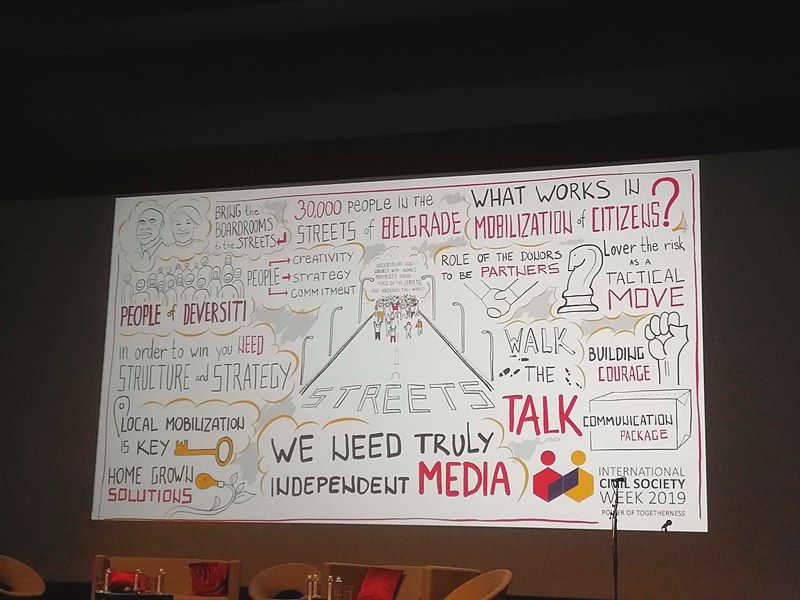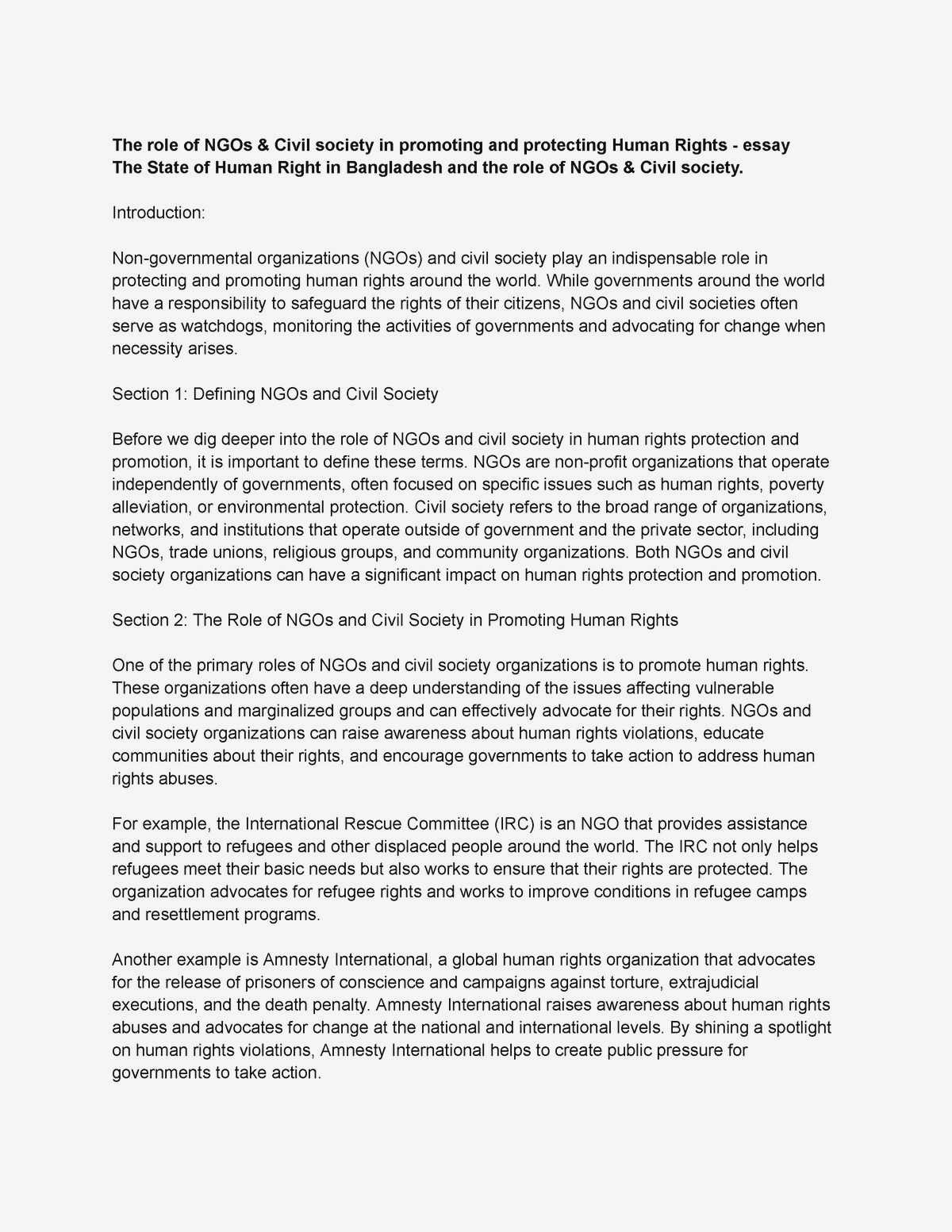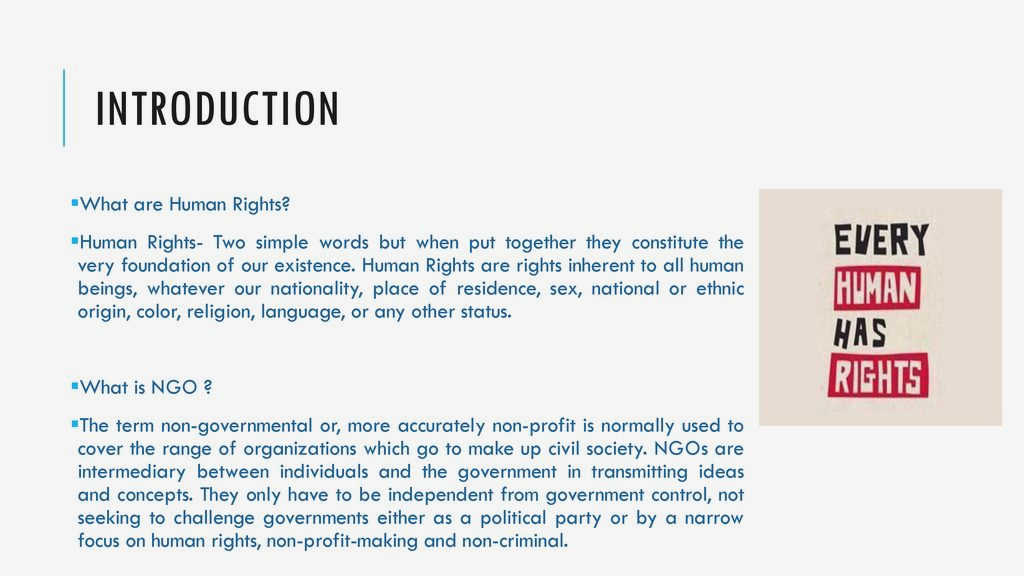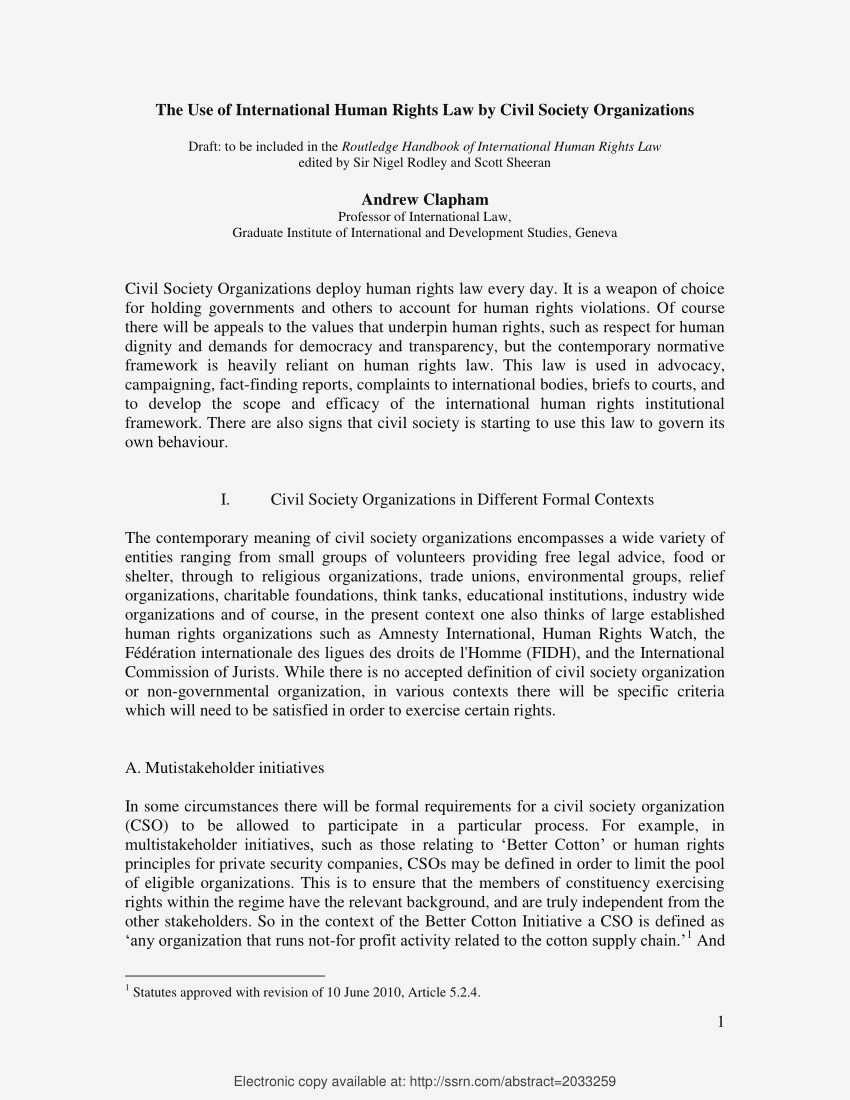Human rights are essential for the dignity and well-being of every individual. However, in many parts of the world, these rights are violated on a regular basis. This is where civil society plays a crucial role in protecting and promoting human rights. Civil society refers to the collective action of individuals, groups, and organizations that work independently of the government to advance social causes.
Civil society organizations (CSOs) have been instrumental in championing human rights in various parts of the world. One notable example is the Human Rights Watch, an international non-governmental organization (NGO) that conducts research and advocacy on human rights issues. Through their reports, they shed light on human rights abuses and put pressure on governments to take action. Another example is Amnesty International, which mobilizes grassroots activism and campaigns for the release of political prisoners.
In some countries, civil society plays a vital role in ensuring gender equality and women’s empowerment. The Global Fund for Women, for instance, supports grassroots organizations that work to improve women’s rights. They provide funding, capacity building, and advocacy support to these organizations, enabling them to make a significant impact on the ground. Similarly, in the LGBTQ+ rights movement, organizations like the International Lesbian, Gay, Bisexual, Trans, and Intersex Association (ILGA) work to protect the rights of sexual and gender minorities.
Furthermore, civil society has been crucial in documenting and addressing human rights abuses during times of conflict and repression. The Syrian Observatory for Human Rights, for example, provides reliable and up-to-date information on human rights violations in Syria. Their work enables the international community to hold perpetrators accountable and seek justice for the victims. Similarly, in countries like Zimbabwe and Venezuela, human rights organizations play a vital role in monitoring and reporting on human rights abuses despite government crackdowns.

In conclusion, civil society plays an essential role in protecting and promoting human rights worldwide. Through their advocacy, research, and activism, civil society organizations are able to shed light on human rights violations, hold governments accountable, and empower marginalized communities. Their work is crucial in ensuring that all individuals can enjoy their fundamental freedoms and live with dignity.
Grassroots Movements that Empower Individuals
Grassroots movements play a crucial role in empowering individuals and promoting human rights around the world. These movements are characterized by their bottom-up approach, originating from the local community and mobilizing individuals to take action.
One example of such a movement is the "Me Too" campaign, which emerged on social media in 2017. It provided a platform for individuals, particularly women, to speak out against sexual harassment and assault. By sharing their personal stories, survivors of abuse were able to raise awareness, challenge societal norms, and advocate for changes in policies and attitudes.
Another powerful grassroots movement is the Fair Trade movement, which aims to address the exploitation of workers in developing countries. Fair Trade organizations work directly with small-scale producers, ensuring that they receive fair wages and working conditions. By promoting ethical consumption, this movement empowers individuals to make choices that support human rights and sustainable development.
The "Black Lives Matter" movement is another notable example of grassroots activism. It emerged in response to police violence and systemic racism targeting Black individuals in the United States. Through protests, advocacy, and community organizing, this movement has shed light on the systemic injustices faced by Black people and has sparked conversations about police reform, racial equality, and social justice.
These grassroots movements demonstrate the power of individual voices and collective action in driving social change. By empowering individuals to take a stand and demand change, these movements challenge existing power structures and work towards a more just and inclusive society.
Advocacy Organizations that Fight for Justice
There are numerous advocacy organizations around the world that work tirelessly to protect human rights and fight for justice. These organizations play a crucial role in holding governments, corporations, and individuals accountable for their actions. They advocate for the rights of marginalized and vulnerable populations, and work towards creating a more just and equitable society.
Amnesty International
Amnesty International is one of the most well-known advocacy organizations that fights for justice. Founded in 1961, Amnesty International works to safeguard human rights by conducting research, advocating for policy changes, and mobilizing individuals to take action. They focus on issues such as freedom of expression, gender equality, and abolishing the death penalty.
Human Rights Watch
Human Rights Watch is another prominent organization that fights for justice and human rights. They investigate and expose human rights abuses and hold those responsible accountable. Human Rights Watch publishes detailed reports on various issues, including refugee rights, LGBTQ+ rights, and the rights of women and children. They also advocate for policy changes and engage with governments and international bodies to address human rights violations.
Transparency International
Transparency International is an organization that fights for justice by combating corruption worldwide. They raise awareness about the damaging effects of corruption, promote transparency and accountability, and work towards the implementation of anti-corruption measures. Transparency International publishes the Corruption Perceptions Index, which ranks countries based on perceived levels of corruption.
Other advocacy organizations that fight for justice include Global Witness, which focuses on exposing environmental and human rights abuses linked to the exploitation of natural resources; the International Federation for Human Rights, which defends human rights defenders and promotes the ratification and implementation of international human rights treaties; and the Center for Economic and Social Rights, which advocates for economic, social, and cultural rights.
These organizations, among many others, play a crucial role in protecting human rights and fighting for justice. Their work is essential in holding those in power accountable, advocating for policy changes, and ensuring that all individuals have their rights upheld and protected.
Non-Governmental Organizations that Monitor Human Rights
Non-governmental organizations (NGOs) play a crucial role in monitoring and advocating for human rights around the world. These organizations are independent of government control and often work in collaboration with other civil society actors, such as activists, lawyers, and researchers, to ensure the protection of human rights.
1. Amnesty International: Founded in 1961, Amnesty International is one of the most prominent human rights monitoring organizations. It investigates and exposes human rights abuses, advocates for change, and campaigns for justice and accountability. Amnesty International operates in more than 150 countries and focuses on issues such as freedom of expression, torture, discrimination, and the rights of refugees and migrants.
2. Human Rights Watch: Human Rights Watch is another renowned NGO that monitors human rights violations worldwide. The organization conducts extensive research and produces detailed reports on various human rights issues, including government repression, violence against women, child labor, and LGBTQ+ rights. Human Rights Watch has regional divisions that focus on specific areas, such as Africa, the Americas, and the Middle East.
3. International Federation for Human Rights (FIDH): FIDH is an international federation of human rights organizations that work together to protect and promote human rights. It coordinates and supports activities of its member organizations, which are based in different countries. FIDH focuses on a wide range of human rights issues, including civil and political rights, economic, social, and cultural rights, and the rights of marginalized groups.
4. ARTICLE 19: ARTICLE 19 is a global NGO that defends and promotes freedom of expression and information. It works to eliminate censorship, promote access to information, and protect the rights of journalists, activists, and ordinary individuals to express their opinions without fear of reprisal. ARTICLE 19 provides legal expertise, policy analysis, and advocacy to ensure the right to freedom of expression is upheld.
In addition to these organizations, there are numerous other NGOs that monitor human rights globally. These organizations play a crucial role in exposing human rights abuses, holding governments accountable, and advocating for justice and equality for all individuals.
Community-Based Initiatives that Promote Equality
There are numerous community-based initiatives around the world that are working towards promoting equality in various aspects of society. These initiatives aim to address discrimination, marginalization, and exclusion by creating opportunities for all individuals to participate and thrive.
Education and Training Programs
One effective way to promote equality is through education and training programs. These initiatives focus on providing access to quality education for all individuals, regardless of their background. They aim to bridge the gap between different socio-economic groups by offering scholarships, mentorship programs, and vocational training.
Advocacy and Awareness Campaigns
Advocacy and awareness campaigns play a crucial role in promoting equality. These initiatives aim to raise awareness about various forms of discrimination, such as gender inequality, racial discrimination, and LGBTQ+ rights. They create platforms for dialogue, engage with policymakers, and advocate for policy changes that promote equality and protect human rights.
Community Empowerment Projects
Community empowerment projects are another form of community-based initiatives that promote equality. These projects focus on enhancing the capacity and agency of marginalized communities. They provide resources, training, and support to individuals and groups, enabling them to advocate for their rights, challenge discriminatory practices, and participate in decision-making processes.
In conclusion, community-based initiatives that promote equality are crucial in addressing various forms of discrimination and promoting human rights. These initiatives work towards creating a more inclusive and equitable society by providing opportunities, raising awareness, and empowering marginalized communities.

Citizen Journalism as a Tool for Awareness
In the modern digital age, citizen journalism has emerged as a powerful tool for raising awareness about human rights violations and fostering social change. Unlike traditional journalism, which is typically controlled by established media outlets, citizen journalism allows individuals to take an active role in reporting and sharing information.

Citizen journalists are ordinary citizens who use their smartphones, social media platforms, and other digital tools to document and report on events happening around them. They provide firsthand accounts of issues that may not be covered or may be underrepresented by the mainstream media. This grassroots approach to journalism allows for a diversity of perspectives and uncensored reporting.
One example of citizen journalism’s impact on human rights awareness is the use of videos recorded by citizens during protests. These videos have shed light on police brutality, government repression, and other violations of human rights. They have been shared widely across social media platforms, reaching a global audience and sparking international outrage and solidarity.
Citizen journalism also plays a vital role in documenting the experiences of marginalized communities and giving them a platform to share their stories. For example, citizen journalists have highlighted the struggles faced by indigenous peoples, refugees, and victims of discrimination, bringing attention to their plight and advocating for change.
In addition to raising awareness, citizen journalism has also played a crucial role in holding authorities accountable for human rights abuses. By capturing and disseminating evidence of violations, citizen journalists contribute to the body of documentation that can be used in legal proceedings and advocacy campaigns.
To conclude, citizen journalism has become an essential tool for raising awareness about human rights issues and promoting social justice. Through their firsthand reporting and use of digital platforms, citizen journalists empower individuals and communities to make their voices heard and hold those in power accountable for their actions. Their work represents a powerful and necessary complement to traditional forms of journalism, ensuring a diversity of perspectives and a deeper understanding of the complex realities of human rights struggles around the world.
Legal Aid Centers that Assist Marginalized Communities
Legal aid centers play a crucial role in protecting the human rights of marginalized communities around the world. These centers provide essential assistance to individuals who may otherwise have limited access to legal resources and knowledge. By offering free or low-cost legal services, they ensure that marginalized communities have the same opportunities to seek justice and protect their rights as any other individual or group.
One example of a legal aid center that has made a significant impact is the Advancement of Women Lawyers (AWL) in South Africa. Established in 1995, AWL focuses on providing legal aid to women in rural areas who have experienced violence or discrimination. The center offers legal advice, representation, and support to empower women and help them navigate the legal system.
In India, the Human Rights Law Network (HRLN) is another prominent legal aid center that advocates for the rights of marginalized communities. HRLN operates through an extensive network of lawyers and activists who offer legal aid and representation to individuals and communities facing human rights violations. From fighting against caste-based discrimination to addressing land and labor rights issues, HRLN has played a crucial role in protecting the rights of marginalized groups in India.
Legal aid centers also exist in countries like Kenya, where the Kituo cha Sheria works to assist marginalized communities, particularly those living in poverty. Through its mobile legal clinics, the center reaches remote areas to provide legal advice, mediation, and representation. By doing so, Kituo cha Sheria seeks to bridge the gap between marginalized communities and their access to justice.
Overall, legal aid centers that assist marginalized communities are vital in upholding human rights. Through their provision of free or low-cost legal services, these centers ensure that individuals and communities who may be overlooked or disadvantaged can access justice and protect their rights.
Educational Programs that Foster Human Rights Education
There are numerous educational programs around the world that are dedicated to fostering human rights education. These programs aim to raise awareness about human rights issues and promote a culture of respect and tolerance.
One example of such a program is the Amnesty International Human Rights Education Program. This program offers a variety of resources and materials for educators, including lesson plans, interactive activities, and multimedia tools. Through these resources, teachers can engage students in discussions and activities that raise awareness about human rights violations and promote empathy and solidarity.
Another example is the Human Rights Education Associates (HREA).
This organization provides online courses and training programs for individuals interested in promoting human rights education. These courses cover a wide range of topics, including children’s rights, gender equality, and refugee rights. By equipping individuals with the knowledge and skills to advocate for human rights, HREA contributes to the development of a global network of human rights activists.
In addition, the Initiatives for Civil Society program in South Africa is dedicated to human rights education in local communities.
This program works with grassroots organizations to develop educational initiatives that address human rights violations and promote social justice. These initiatives include workshops, seminars, and awareness campaigns that empower individuals to become active participants in the protection of human rights.
Overall, these educational programs play a crucial role in fostering human rights education by raising awareness, providing resources, and empowering individuals to become advocates for human rights. Through their efforts, they contribute to the promotion of a more just and inclusive society.
Artistic Expression as a Form of Activism
Introduction
Artistic expression has long been recognized as a powerful tool for advocating social and political change. Through various forms of art, such as music, visual arts, and performance, individuals and groups have been able to challenge norms, provoke thought, and drive activism.
Music as Activism
Music has historically played a significant role in social and political movements. From Bob Dylan’s iconic protest songs during the civil rights era to the hip-hop music of the 1980s and 1990s that addressed systemic injustices, musicians have used their lyrics and melodies as a means to raise awareness and inspire action.
Through their songs, artists can amplify the voices of marginalized communities, shed light on human rights violations, and demand accountability from those in power. The power of music lies in its universal appeal, as it can emotionally connect with people across languages, cultures, and borders.
Visual Arts and Performance as Activism
Visual arts, including painting, sculpture, and photography, provide a visual representation of human rights issues. Artists have the ability to capture emotions, document social injustices, and challenge conventional thinking through their creative expressions. These visual forms of activism can serve as powerful tools to spark dialogue, challenge the status quo, and advocate for change.
Similarly, performance art can push boundaries and provoke thought on human rights issues. Through theater, dance, and other forms of performance, artists can embody different perspectives, amplify unheard voices, and confront societal prejudices. These performances have the power to create empathy, challenge societal norms, and inspire action for human rights.
Impact and Challenges
Artistic expression as a form of activism has the potential to reach a wide audience and create lasting impact. By tapping into emotions and conveying powerful messages, art can engage individuals in a way that other mediums may not.
However, artists and activists utilizing artistic expression often face challenges, including censorship, repression, and backlash. Governments and those in power may attempt to silence artists who challenge the status quo or criticize their actions. Despite these challenges, artists continue to push boundaries, raise awareness, and advocate for human rights through their artistic expressions.
Conclusion
Artistic expression serves as a powerful means of activism, enabling individuals and communities to challenge social norms, raise awareness, and drive change. Whether through music, visual arts, or performance, artists have the ability to inspire action, promote empathy, and advocate for human rights. Despite the challenges they may face, artists continue to play a vital role in protecting and promoting human rights around the world.
Networked Movements that Connect and Mobilize
In today’s interconnected world, civil society movements have increasingly turned to networking to connect individuals and mobilize for human rights causes. Networked movements utilize technology and social media platforms to reach a wider audience, coordinate action, and raise awareness about human rights issues.
One example of a networked movement is the Arab Spring, which began in 2010 and swept across the Middle East and North Africa. Activists used social media platforms like Facebook and Twitter to mobilize and organize protests, demanding political and social reforms. The use of technology allowed for faster communication, coordination, and information sharing among activists, leading to the spread of the movement across multiple countries.
Another notable networked movement is the #BlackLivesMatter movement, which emerged in the United States in 2013. This movement seeks to address systemic racism and violence against Black individuals in the country. By leveraging social media platforms, activists are able to raise awareness about cases of police brutality, organize protests, and advocate for policy changes. The interconnected nature of the movement has allowed it to gain international attention and solidarity.
Networked movements also play a crucial role in advocating for the rights of marginalized communities. For example, the LGBTQ+ movement has utilized online platforms and networks to mobilize for equal rights and social acceptance. By sharing personal stories and experiences, activists have been able to challenge discriminatory practices and advocate for inclusive policies.
Furthermore, networked movements have been instrumental in addressing environmental issues and promoting sustainability. The global Fridays for Future movement, inspired by the activism of Greta Thunberg, utilizes online platforms to organize climate strikes and demand action on the climate crisis. By connecting individuals and organizations around the world, this movement has successfully raised awareness about the urgency of addressing climate change.
In conclusion, networked movements have transformed the way civil society engages with human rights issues. By leveraging technology and social media platforms, these movements are able to connect individuals, mobilize for action, and raise awareness on a global scale. Through networking, activists can create a stronger and more effective advocacy force, leading to positive change in the protection of human rights.
International Solidarity Actions to Support Global Human Rights
1. Civil Society Campaigns: Civil society organizations around the world play a crucial role in raising awareness about human rights violations and advocating for change. Through campaigns, they mobilize individuals and communities to take action, whether through signing petitions, participating in protests, or advocating for policy reforms. These campaigns bring attention to global human rights issues and put pressure on governments and international bodies to take action.
2. International Conferences and Forums: International conferences and forums provide a platform for discussions on global human rights challenges and potential solutions. These events bring together representatives from civil society organizations, governments, and international institutions to exchange ideas, share best practices, and coordinate their efforts. They provide an opportunity for solidarity actions such as joint statements and resolutions calling for the protection and promotion of human rights.

3. Human Rights Observatories: Human rights observatories are initiatives that monitor human rights conditions in different countries or regions. They collect and analyze data, document human rights abuses, and publish reports to raise awareness and hold perpetrators accountable. These observatories often rely on international solidarity actions to amplify their findings and advocate for justice and accountability.
4. Grassroots Activism: Grassroots activists play a critical role in supporting global human rights by organizing and mobilizing communities at the local level. They engage in activities such as educating their communities about human rights, providing support to victims of human rights abuses, and advocating for policy changes. Grassroots activism connects local struggles to the broader global human rights movement, fostering solidarity and amplifying the voices of those most affected.
5. Legal Advocacy and Litigation: Organizations dedicated to legal advocacy and litigation support global human rights by fighting for justice and accountability through legal means. They may provide legal representation to victims of human rights abuses, file lawsuits against perpetrators, or advocate for legal reforms that strengthen human rights protections. Through their work, they contribute to the development of international law and ensure that human rights are upheld globally.

6. Online Activism: In the digital age, online activism has become a powerful tool for supporting global human rights. Activists and organizations use social media platforms, online petitions, and crowdfunding campaigns to raise awareness, mobilize supporters, and exert pressure on governments and international actors. Online activism facilitates global solidarity actions by enabling individuals from different countries to connect and collaborate in real-time.
7. Economic Boycotts and Sanctions: Economic boycotts and sanctions are solidarity actions aimed at pressuring governments or corporations to change their policies or practices that violate human rights. They involve individuals, organizations, and governments refusing to engage in economic activities with the target country or company until they take steps to address human rights concerns. Economic pressure can be a powerful tool for effecting change and raising awareness about global human rights issues.
8. Human Rights Education: Human rights education is an important tool for promoting global solidarity and supporting human rights. It involves raising awareness about human rights principles, teaching individuals about their rights and responsibilities, and fostering a culture of respect for human rights. By educating individuals and communities, human rights education contributes to building a global network of individuals who are knowledgeable about and committed to upholding human rights.





